Fleurs du Mal Magazine


Or see the index

The Star
Last night
I watched a star fall like a great pearl into the sea,
Till my ego expanding encompassed sea and star,
Containing both as in a trembling cup.
Lola Ridge
(1873-1941)
The Star
• fleursdumal.nl magazine
More in: Archive Q-R, Archive Q-R, Ridge, Lola
The definitive edition of selected work from a poet whose influence continues to be widely felt today, introduced by Natasha Trethewey
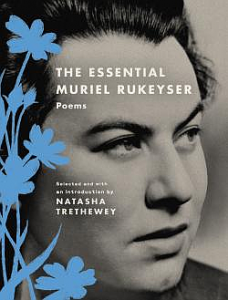 Engaging closely with the violence, oppression, and injustice that she witnessed in her lifetime, Muriel Rukeyser was one of the seminal poets of the mid-twentieth century.
Engaging closely with the violence, oppression, and injustice that she witnessed in her lifetime, Muriel Rukeyser was one of the seminal poets of the mid-twentieth century.
Closely informed by issues relating to equality, social justice, feminism, and Judaism, her impassioned poetry was often seen as a mode of social protest, but it was also heralded for its deep emotional impact; its personal perspective; forthright discussion of the female experience, particularly sex and single parenthood at a time when these topics were largely taboo; and its wide-ranging exploration of genre and form.
As Adrienne Rich wrote: “Muriel Rukeyser’s poetry is unequalled in the twentieth-century United States…She pushes us…to enlarge our sense of what poetry is about in the world, and of the place of feelings and memory in politics.”
The Essential Muriel Rukeyser represents the curation of Rukeyser’s most enduring and urgent work, gathered in one volume that spans the many decades of her life and career, and with an introduction from Natasha Trethewey, one of our most important contemporary poets.
‘This posthumous collection affirms Rukeyser’s importance as a poet of witness.’ — New York Times
The Essential Muriel Rukeyser
Poems
By Muriel Rukeyser
Foreword by Natasha Trethewey
ISBN: 9780062985491
ISBN 10: 0062985493
Imprint: Ecco
2021
Trimsize: 6x7in
Pages: 224 pages
$16.99
• fleursdumal.nl magazine
More in: #Editors Choice Archiv, - Book News, Archive Q-R, Archive Q-R

The Song Of Iron
I
Not yet hast Thou sounded
Thy clangorous music,
Whose strings are under the mountains…
Not yet hast Thou spoken
The blooded, implacable Word…
But I hear in the Iron singing –
In the triumphant roaring of the steam and pistons pounding –
Thy barbaric exhortation…
And the blood leaps in my arteries, unreproved,
Answering Thy call…
All my spirit is inundated with the tumultuous passion of Thy Voice,
And sings exultant with the Iron,
For now I know I too am of Thy Chosen…
Oh fashioned in fire –
Needing flame for Thy ultimate word –
Behold me, a cupola
Poured to Thy use!
Heed not my tremulous body
That faints in the grip of Thy gauntlet.
Break it… and cast it aside…
But make of my spirit
That dares and endures
Thy crucible…
Pour through my soul
Thy molten, world-whelming song.
… Here at Thy uttermost gate
Like a new Mary, I wait…
II
Charge the blast furnace, workman…
Open the valves –
Drive the fires high…
(Night is above the gates).
How golden-hot the ore is
From the cupola spurting,
Tossing the flaming petals
Over the silt and furnace ash –
Blown leaves, devastating,
Falling about the world…
Out of the furnace mouth –
Out of the giant mouth –
The raging, turgid, mouth –
Fall fiery blossoms
Gold with the gold of buttercups
In a field at sunset,
Or huskier gold of dandelions,
Warmed in sun-leavings,
Or changing to the paler hue
At the creamy hearts of primroses.
Charge the converter, workman –
Tired from the long night?
But the earth shall suck up darkness –
The earth that holds so much…
And out of these molten flowers,
Shall shape the heavy fruit…
Then open the valves –
Drive the fires high,
Your blossoms nurturing.
(Day is at the gates
And a young wind…)
Put by your rod, comrade,
And look with me, shading your eyes…
Do you not see –
Through the lucent haze
Out of the converter rising –
In the spirals of fire
Smiting and blinding,
A shadowy shape
White as a flame of sacrifice,
Like a lily swaying?
III
The ore leaping in the crucibles,
The ore communicant,
Sending faint thrills along the leads…
Fire is running along the roots of the mountains…
I feel the long recoil of earth
As under a mighty quickening…
(Dawn is aglow in the light of the Iron…)
All palpitant, I wait…
IV
Here ye, Dictators – late Lords of the Iron,
Shut in your council rooms, palsied, depowered –
The blooded, implacable Word?
Not whispered in cloture, one to the other,
(Brother in fear of the fear of his brother…)
But chanted and thundered
On the brazen, articulate tongues of the Iron
Babbling in flame…
Sung to the rhythm of prisons dismantled,
Manacles riven and ramparts defaced…
(Hearts death-anointed yet hearing life calling…)
Ankle chains bursting and gallows unbraced…
Sung to the rhythm of arsenals burning…
Clangor of iron smashing on iron,
Turmoil of metal and dissonant baying
Of mail-sided monsters shattered asunder…
Hulks of black turbines all mangled and roaring,
Battering egress through ramparted walls…
Mouthing of engines, made rabid with power,
Into the holocaust snorting and plunging…
Mighty converters torn from their axis,
Flung to the furnaces, vomiting fire,
Jumbled in white-heaten masses disshapen…
Writhing in flame-tortured levers of iron…
Gnashing of steel serpents twisting and dying…
Screeching of steam-glutted cauldrons rending…
Shock of leviathans prone on each other…
Scaled flanks touching, ore entering ore…
Steel haunches closing and grappling and swaying
In the waltz of the mating locked mammoths of iron,
Tasting the turbulent fury of living,
Mad with a moment’s exuberant living!
Crash of devastating hammers despoiling..
Hands inexorable, marring
What hands had so cunningly moulded…
Structures of steel welded, subtily tempered,
Marvelous wrought of the wizards of ore,
Torn into octaves discordantly clashing,
Chords never final but onward progressing
In monstrous fusion of sound ever smiting on sound
in mad vortices whirling…
Till the ear, tortured, shrieks for cessation
Of the raving inharmonies hatefully mingling…
The fierce obligato the steel pipes are screaming…
The blare of the rude molten music of Iron…
Lola Ridge
(1873-1941)
The Song Of Iron
• fleursdumal.nl magazine
More in: Archive Q-R, Archive Q-R, Ridge, Lola
»Ich habe die weissen Städte so wiedergefunden, wie ich sie in den Träumen gesehn hatte.
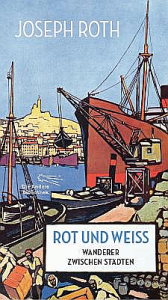 « Von Lyon über Vienne, Les Baux, Nîmes, Avignon und Arles, Tarascon nach Marseille – mit dreißig Jahren geht Joseph Roth den klingenden Namen der Sehnsuchtsorte seiner Jugend nach, sein frühester Traum erfüllt sich und er wird dort, wo er nie war, »wieder ein Kind«.
« Von Lyon über Vienne, Les Baux, Nîmes, Avignon und Arles, Tarascon nach Marseille – mit dreißig Jahren geht Joseph Roth den klingenden Namen der Sehnsuchtsorte seiner Jugend nach, sein frühester Traum erfüllt sich und er wird dort, wo er nie war, »wieder ein Kind«.
Ausgestattet mit einem Reportageauftrag der »Frankfurter Zeitung« geht Roth 1925 auf eine Reise durch den französischen Midi: »Die weißen Städte« des unteren Rhônetals und der Provence mit Marseille sind sein Ziel. Es sind die Orte, in die er sich als Kind aus dem galizischen Schtetl Brody gewünscht hat.
Was er als Reisebuch unter dem Titel Die weißen Städte komponiert, sollte so nie gedruckt werden. Das Buch, ein Schlüsselwerk Joseph Roths, erhält sich bloß als Typoskript. Auch in den späteren Werkausgaben und Anthologien findet es entweder entstellt oder nur in anteiliger Überlieferung Aufnahme. Nun werden Die weißen Städte erstmals vollständig, anhand des im Literaturarchiv Marbach verwahrten Typoskripts von Roths letzter Hand veröffentlicht.
Wie Joseph Roth auf seiner Reise durch Südfrankreich eine Traumreise in ost-westlicher Richtung reflektiert, hatte er zuvor die umgekehrte Route genommen: 1927 erscheint sein Großessay über das Ostjudentum Juden auf Wanderschaft, geschrieben für »Westeuropäer, die auf ihre sauberen Matratzen nicht stolz sind«.
Von galizischen Städten und dunklen Bethäusern – aber auch von Ostjuden in den westeuropäischen Ghettos von Paris, Wien und Berlin schreibt Roth. In der Zusammenschau mit den Weißen Städten, mit denen die Juden auf Wanderschaft vielfach korrespondieren, finden wir uns in der zentralen Stelle von Joseph Roths Werk, zwischen persönlichem Essay und literarischem Schreiben, zwischen der Feuilleton-Gewitztheit des Journalisten und der Poetik des Prosadichters.
Volker Breidecker führt durch beide Texte, reichert sie an durch Lektüren von Briefen an Freunde und Zeitgenossen, unveröffentlichten Texten aus den Archiven und entdeckt uns durch die tiefe Kennerschaft der Materialien in einem biographischen Essay den Joseph Roth der 1920er-Jahre.
Joseph Roth (1894–1939) war österreichisch-jüdischer Romancier und Journalist. Nach Kindheit und Jugend im galizischen Städtchen Brody wird Roth mit Stationen über Lemberg und Wien zu einem der wichtigsten Autoren der Zeit zwischen den beiden Weltkriegen. Er stirbt verarmt und nach schwerer Krankheit noch vor dem Ausbruch des Zweiten Weltkriegs 1939 in Paris.
Volker Breidecker (geb. 1952 in Mainz) ist als Literaturwissenschaftler und Publizist einer der besten Kenner Joseph Roths und seiner Zeitgenossen. Für die Andere Bibliothek erschloss er Leben, Werk und Schicksal von Grete De Francesco in ihrer wiederentdeckten Studie Die Macht des Charlatans (Band 434, Februar 2021).
Joseph Roth
Rot und Weiß
Wanderer zwischen den Städte
03.2022
Seitenanzahl: 334
Originalausgaben
Bandnummer: 446
Mit einem Nachwort von Volker Breidecker.
Originalausgabe, nummeriert und limitert.
Fadenheftung mit Lesebändchen.
Buchgestaltung: Buchgut, Berlin
ISBN: 9783847704461
44,00 EUR
• fleursdumal.nl magazine
More in: Archive Q-R, Archive Q-R, Art & Literature News, Joseph Roth
A story told in verse, Teething begins when Kochu, a young boy in Kerala, is caught kissing the neighbour’s son. All hell breaks loose, ending in Kochu taking his own life.
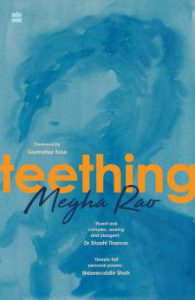 Years after the scandal, after discovering his suicide note, his oldest sister, Achu, sets out to uncover the mysteries of their dysfunctional family by putting pieces of their past back together.
Years after the scandal, after discovering his suicide note, his oldest sister, Achu, sets out to uncover the mysteries of their dysfunctional family by putting pieces of their past back together.
Along the way, she discovers things she never noticed – their mother’s brokenness and obsession with the church, their father’s disturbing secrecy inside the bedroom, and, of course, their own individual traumas that stopped time altogether. Soon, Achu realizes that none of them will ever truly grow up until they live their lives all over again, from the very beginning.
Megha Rao is a confessional performance poet and a surrealist artist. Her work has been featured on platforms such as Penguin Random House India, Firstpost, The Open Road Review, New Asian Writing, The Alipore Post, Spoken Fest, Why Indian Men Rape and Thought Catalog. Megha is a postgraduate in English Literature from the University of Nottingham, UK, and is currently spending her time between Mumbai and Kerala.
Teething
by Megha Rao
Language: English
Publisher: HarperCollins
(December 20, 2021)
Paperback
88 pages
ISBN-10: 9354894305
ISBN-13: 978-9354894305
$14.12
• fleursdumal.nl magazine
More in: #Modern Poetry Archive, Archive Q-R, Archive Q-R

To The Others
I see you, refulgent ones,
Burning so steadily
Like big white arc lights…
There are so many of you.
I like to watch you weaving –
Altogether and with precision
Each his ray –
Your tracery of light,
Making a shining way about America.
I note your infinite reactions –
In glassware
And sequin
And puddles
And bits of jet –
And here and there a diamond…
But you do not yet see me,
Who am a torch blown along the wind,
Flickering to a spark
But never out.
Lola Ridge
(1873-1941)
To The Others
• fleursdumal.nl magazine
More in: Archive Q-R, Archive Q-R, Ridge, Lola
Ton van Reen schreef onder meer romans, kinder- en jeugdboeken en journalistiek werk.
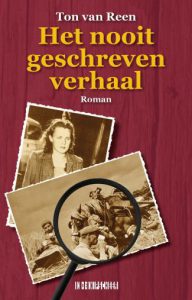 Bekend zijn de romans Het winterjaar, Roomse meisjes en Concert voor de Führer. Gestolen jeugd is het ware verhaal van jongens en mannen die aan het eind van de Tweede Wereldoorlog als dwangarbeiders naar Duitsland werden gevoerd. De lichtverkoper werpt licht op een donker tijdperk in de geschiedenis van de kinderarbeid in de negentiende eeuw. De verdwenen stad is de werdegang van een advocaat. Dochters is het levensverhaal van een journalist in Afrika. Katapult is een verhaal over gewone mensen in roerig Amsterdam in de vorige eeuw. De bende van de bokkenrijders werd verfilmd tot een veelbekroonde tv-serie. In Frankrijk spelen zijn boeken Vlucht uit Montaillou, Bevroren dromen, Landverbeuren en In het spoor van de camisards.
Bekend zijn de romans Het winterjaar, Roomse meisjes en Concert voor de Führer. Gestolen jeugd is het ware verhaal van jongens en mannen die aan het eind van de Tweede Wereldoorlog als dwangarbeiders naar Duitsland werden gevoerd. De lichtverkoper werpt licht op een donker tijdperk in de geschiedenis van de kinderarbeid in de negentiende eeuw. De verdwenen stad is de werdegang van een advocaat. Dochters is het levensverhaal van een journalist in Afrika. Katapult is een verhaal over gewone mensen in roerig Amsterdam in de vorige eeuw. De bende van de bokkenrijders werd verfilmd tot een veelbekroonde tv-serie. In Frankrijk spelen zijn boeken Vlucht uit Montaillou, Bevroren dromen, Landverbeuren en In het spoor van de camisards.
Ton van Reen over het ontstaan van zijn nieuwe roman:
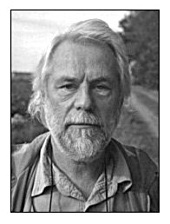 “Zestig jaar geleden werkte ik als leerling-verpleger in Psychiatrisch Ziekenhuis Ursula in Wassenaar. Drie avonden in de week bezocht ik de avond-HBS in Den Haag. Bij thuiskomst kwam ik vaak, op eigen verzoek, in de nachtdienst terecht.
“Zestig jaar geleden werkte ik als leerling-verpleger in Psychiatrisch Ziekenhuis Ursula in Wassenaar. Drie avonden in de week bezocht ik de avond-HBS in Den Haag. Bij thuiskomst kwam ik vaak, op eigen verzoek, in de nachtdienst terecht.
Vaak had ik lange gesprekken met patiënten die slecht sliepen. Er was een man die mij het verhaal vertelde over een misdaad die hij niet had begaan maar waarvoor hij de schuld op zich had genomen. Uit liefde. Daarna belandde hij lange jaren in de gevangenis.
Zijn verhaal bleef mijn leven lang in mijn hoofd hangen. Ik wilde het ooit opschrijven. Het kwam er nooit van.
Het drama had zich afgespeeld in een kloosterdorp, in Brabant of Limburg, zoals Velp bij Grave, of Steijl bij Tegelen. Tot ik opeens besefte dat er ook zo’n dorp met een psychiatrische inrichting bij mij in de buurt lag. Koningslust, een kerkdorp van de gemeente Helden waar zich een deel van mijn jeugd had afgespeeld. Een dorp dat mede ontstaan was door het klooster dat er in 1849 was gesticht door de Broeders van Sint Joseph.
Alles viel op zijn plek. Ik had een handvat om het verhaal waarvan ik alleen de kern kende, op te schrijven. Het verhaal had ik zestig jaar geleden gehoord en het speelde zestig jaar eerder, rond 1900. Ik besloot het in deze tijd te plaatsen. Het is immers een verhaal van alle tijden. De kern, over de man die zich opoffert uit liefde, blijft.”
Ton van Reen
Het nooit geschreven verhaal
Roman
Vormgeving omslag Carmen Arends
Gebrocheerd in omslag
240 blz.
Uitgeverij In de Knipscheer
ISBN 978-94-93214-68-2
Eerste uitgave maart 2022
€ 19,50
• fleursdumal.nl magazine
More in: - Book News, - Bookstores, Archive Q-R, Archive Q-R, Psychiatric hospitals, Reen, Ton van, Reen, Ton van, Ton van Reen
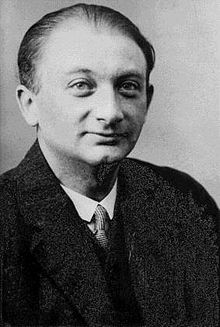
Karneval
Alle Tage feiern wir Karneval,
wir haben es nicht nötig, uns eigens zu maskieren,
weil wir unser eigenes Angesicht verlieren;
wir sind: ein Untertan, ein Sergeant, ein General,
ein deutscher Student mit Bändern und Schmissen,
eine Pickelhaube, ein geschliffenes Bajonett,
ein schleppender Säbel, ein Pastorenbarett,
und eine Prothese, ewig zu hinken beflissen.
Wir sind ein Volk in Masken und Kostümen –
uns schuf ein göttlicher Feldwebel nach seinem Ebenbilde.
Wir sind ein Unteroffiziersverein, eine Millionenmaskengilde,
eine Schupopostenkette, ein fast lebendiger Drahtverhau,
ein betäubender Wirrwar aus Uniformgrau,
unterbrochen von reizenden roten Striemen . . .
Also gekleidet in verschiedene Trachten,
leben wir munter, schießen und bedienen
bald einen Kaiser und bald ein Maschinengewehr – –
Kriege verlierend, gewinnen wir Schlachten,
arbeiten nach dem Lesebuchmuster der Bienen
vierundzwanzig Stunden im Tage und manchmal mehr.
Über uns ein Gott, der Eisen wachsen läßt,
auf einem gelbmaskierten Himmel aus giftigen Gasen,
umgeben von Engeln, die den Fridericus-Rex-Marsch blasen – –
mit eisernen Kreuzen geziert, livriert und betreßt,
nehmen sie teil an unserm Karnevalsfest.
Und ertönt ein Kommando, das ein oberster Kriegsherr rief,
so können wir nicht anders und werden erschossen,
insofern wir Proleten, Juden und Genossen – –
Und flüstern sterbend, dankerfüllt und tief:
Ehre sei dem General in der Höh’ und Kants kategorischem Imperativ!
Joseph Roth
(1894 – 1939)
Karneval
Gedicht, 7. 3· I924
• fleursdumal.nl magazine
More in: Archive Q-R, Archive Q-R, Joseph Roth
Met zijn nieuwe dichtbundel Komijnsplitsers zet Marieke Lucas Rijneveld opnieuw een grote stap in zijn dichterschap.
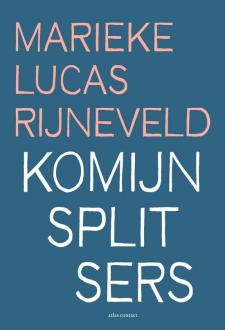 In acht afdelingen onderzoekt Rijneveld wat het betekent om te wonen: in een huis, in jezelf en in verhoudingen tot anderen. Wie of wat heb je nodig om een compleet mens te zijn?
In acht afdelingen onderzoekt Rijneveld wat het betekent om te wonen: in een huis, in jezelf en in verhoudingen tot anderen. Wie of wat heb je nodig om een compleet mens te zijn?
In een van de gedichten wordt verhaald over het verlangen één ruimte te zijn; iemand zoekt een brandtrap uit deze dag, trekt in plaats van een grijs vest een jongen aan.
De vrees om iemand te worden die de ander niet kan hebben – ‘om de verkeerde mens om je beenderen te vormen’ – vormt het grootste gevaar voor het maar al te herkenbare en hoopvolle verlangen naar groei.
In een taal die naar adem hapt en het zweet van het voorhoofd veegt, staat ‘Komijnsplitsers’ als een huis. In 2020 won Marieke Lucas Rijneveld de International Booker Prize voor ‘De avond is ongemak’.
Komijnsplitsers
Marieke Lucas Rijneveld
Uitgever: Atlas Contact
Taal: Nederlands
Bladzijden: 104 pp.
Bindwijze: Paperback
Genre: Poezie
ISBN 9789025471200
Verwacht 20-1-2022
€19,99
# new poetry
Komijnsplitsers
Marieke Lucas Rijneveld
• fleursdumal.nl magazine
More in: #Editors Choice Archiv, - Book News, - Bookstores, Archive Q-R, Archive Q-R, Art & Literature News, Marieke Lucas Rijneveld, Rijneveld, Marieke Lucas
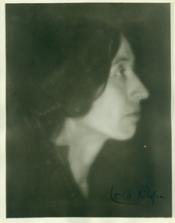
The Fog
Out of the lamp-bestarred and clouded dusk –
Snaring, illuding, concealing,
Magically conjuring –
Turning to fairy-coaches
Beetle-backed limousines
Scampering under the great Arch –
Making a decoy of blue overalls
And mystery of a scarlet shawl –
Indolently –
Knowing no impediment of its sure advance –
Descends the fog.
Lola Ridge
(1873-1941)
The Fog
• fleursdumal.nl magazine
More in: Archive Q-R, Archive Q-R, Ridge, Lola

Time-Stone
Hallo, Metropolitan –
Ubiquitous windows staring all ways,
Red eye notching the darkness.
No use to ogle that slip of a moon.
This midnight the moon,
Playing virgin after all her encounters,
Will break another date with you.
You fuss an awful lot,
You flight of ledger books,
Overrun with multiple ant-black figures
Dancing on spindle legs
An interminable can-can.
But I’d rather… like the cats in the alley… count time
By the silver whistle of a moonbeam
Falling between my stoop-shouldered walls,
Than all your tally of the sunsets,
Metropolitan, ticking among stars.
Lola Ridge
(1873-1941)
Time-Stone
• fleursdumal.nl magazine
More in: Archive Q-R, Archive Q-R, Ridge, Lola
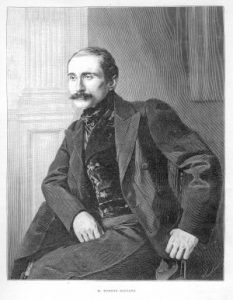
Les Rois Mages
Ils perdirent l’étoile, un soir ; pourquoi perdon
L’étoile ? Pour l’avoir parfois trop regardée,
Les deux rois blancs, étant des savants de Chaldée,
Tracèrent sur le sol des cercles au bâton.
Ils firent des calculs, grattèrent leur menton,
Mais l’étoile avait fuit, comme fuit une idée.
Et ces hommes dont l’âme eût soif d’être guidée
Pleurèrent, en dressant des tentes de coton.
Mais le pauvre Roi noir, méprisé des deux autres,
Se dit ‘Pensons aux soifs qui ne sont pas les nôtres,
Il faut donner quand même à boire aux animaux.’
Et, tandis qu’il tenait son seau d’eau par son anse,
Dans l’humble rond de ciel où buvaient les chameaux
Il vit l’étoile d’or, qui dansait en silence.
Edmond Rostand
(1868-1918)
Les Rois Mages
• fleursdumal.nl magazine
More in: Archive Q-R, Archive Q-R, CLASSIC POETRY
Thank you for reading Fleurs du Mal - magazine for art & literature